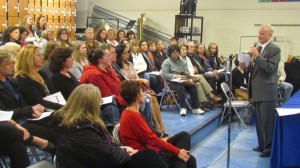‘A Mother and Father’s Worst Nightmare’
By Michael Turton
A community-wide conversation about the use of heroin and other drugs in Philipstown continued at a forum hosted by the Haldane PTA on April 23 (Wednesday). The session, held in the Haldane school music room, featured a presentation, A Mother and Father’s Worst Nightmare, by Susan and Steve Salomone. The two speak from experience. Their 29-year-old son Justin died of a heroin overdose in 2012. Shortly after his death the couple co-founded Drug Crisis in Our Backyard and now give programs across Westchester and Putnam Counties, shedding light on their family’s tragic experience and the issues surrounding drug addiction.
Susan Salomone painted an intimate portrait of her son’s life — and death. “He was a good baby … always in a good mood … he had a great smile,” she said. She recounted how Justin navigated high school without getting into any serious trouble. That changed drastically at age 19, the first time he was arrested for drug possession. After using marijuana and later opiate-based painkillers, he turned to heroin at age 25. He died four years later.

“There is nothing worse than having your kid die, especially from an overdose,” Mrs. Salomone said. “Forever you will question what you did wrong.”
Steve Salomone spoke of the signs and symptoms of his son’s drug abuse, many of which he and his wife either did not catch — or simply denied. “We missed significant signs … I feel so stupid,” he said. Among those signs were his son’s second arrest for possession, theft of Steve’s valuable jewelry, lying about graduating from college and Justin’s tendency to fall asleep in meetings while working at his father’s real estate office. Salomone said his failure to connect the dots when Justin dozed off in meetings was typical of his own denial. “I dismissed it. I wanted my son to be normal.”
The Salomones did do many things right — from putting their son in counseling and taking him to Alcoholics Anonymous meetings to having him diagnosed at a major hospital and finding him good jobs. But in the end it wasn’t enough.
A second presentation by Doreen Lockwood, director of prevention services at covecarecenter.org, and Elaine Santos, coordinator with the Putnam County Communities That Care Coalition, included information from the biennial survey of Putnam County students regarding substance abuse. The survey, in which Haldane participates, includes students in grades eight through 12. The session also offered advice to parents on how to talk to young children about the danger of drugs.
Family history is significant
Lockwood stressed that drug addiction is a disease and is recognized as such by the American Medical Association. More than one speaker also pointed out that it is a disease that can run in families. Lockwood said that someone who is part of a family with addiction issues is four times as likely to become an addict and if the person is a male, the probability of becoming an addict is nine times greater. Steve Salomone added that despite that, doctors prescribing painkillers seldom if ever ask patients if their family has members who suffer from drug addiction. Addiction to opiate-based painkillers is common and often leads to heroin use, in part due to the lower cost.

Statistics highlighted from the 2012 Putnam County survey showed that children first drink alcohol at age 13, although that threshold has inched up slightly in recent years. Marijuana use typically begins at about age 14. Lockwood said that such young ages represent a two-fold danger — that the young human brain is in the developmental stage through age 25 and that statistics show that the younger people begin taking drugs or alcohol the more likely they are to become addicted. “Kids need structure, discipline and rules,” she said. “Should you check (your children’s) backpacks? Yes! It’s your house — and they’re your rules.”
Few men in the audience
About 50 people attended the session, mainly mothers whose children are in elementary, middle or high school at Haldane. Santos said that women typically attend such meetings more, an observation that Susan Salomone agreed with. “Men need to come out more,” she said. “Most of the support groups we attend are made up mostly of women.”
Lockwood added that when dealing with their children about the harm that drugs can do, “Parents need to be aligned … even in divorce situations.”
Heroin is no ‘giant leap’
At the outset of the forum, Haldane High School Principal Brian Alm wondered if the conversation about drugs, and heroin use in particular, is “starting to wane a bit” locally. In his view, part of the problem is that young people “perceive that it is a giant leap to heroin” from other drugs. “It isn’t,” he said. “It’s very easy in our sleepy little town to think that it can’t happen to me.” Alm said that earlier that day, a student assembly featured talks by a 21- and 29-year-old, both recovering drug addicts. He said the presentation had an impact on students who listened “with their hearts and with their minds.”
“We are by no means done,” PTA President Lourdes Laifer told Philipstown.info/The Paper in an email the day after the forum. Laifer said that she will work with the Haldane administration to host additional drug forums for parents and students. Materials distributed at Thursday’s presentation will also available on the PTA website.
